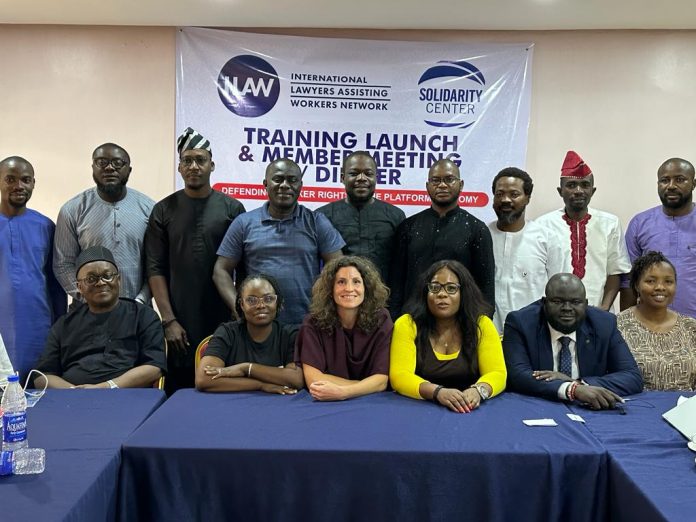By Michael Oche
Solidarity Centre has launched a training for lawyers under the aegis of International Lawyers Assisting Workers Network (ILAW) in a bid to build their capacities to defend the rights of workers in the platform economy.
The platform economy has seen steady growth since the COVID-19 pandemic, but has also experienced increasing cases of exploitation of workers.
The training is coming amid growing agitation for improve working conditions for workers in platform economy.
“We hope to start to build the capacity of these platform workers and as well as lawyers as members of ILAW. There is no way you can challenge the multinational companies or even nationally own platform companies, without the assistance of dedicated lawyers,” Edi Eric, Program Officer Africa Department at the Solidarity Center DC office said at the launch of the training in Abuja.
Eric emphasized the need for stronger collaboration to ensure improved working conditions for workers in the platform economy.
Our Correspondent reports that the International Labour Organisation (ILO) Governing Body has announced that it will add to its 2025 Conference an agenda item to discuss standards related to decent work on the platform economy.
Jacquline Wambai Wamai, Regional Coordinator ILAW Sub Sahara Africa told journalists during the launch in Abuja that the training for lawyers have become necessary since existing labour laws have not adequately captured the peculiarities of platform workers.
She said, “We are talking about a situation where we are foreseeing a lot of situation where these new forms of work will not necessarily fall within the boundaries of labour laws, meaning that workers are not protected, they are left unprotected and that’s why the first fight around platform economy is really the issue of misclassification because it means if you’re declared as an independent contractor, you do not have the rights under the Labour laws.”
She explained that the training of the lawyers, which will last six months, will basically look at the trends in Africa but also globally to understand how massive the sector is and which industries we are seeing this platform economy.
In her words, “I know that we’ve been looking at the e-hailing sector and the delivery sector. But now, even the domestic sector is becoming more and more in the platform economy.
“But also we have to be able to look at the social media workers who are working as content creators and also as content moderators in different social media companies. We’re still going to tease out the aspect of the labour laws, the boundaries of the labour laws. And how these workers are continuing being pushed outside the boundaries of the labour laws and why it’s important to interpret labour laws to really cover these workers.”
She noted that some content moderators for social media companies have suffered from panic attacks and post-traumatic stress disorder (PTSD) due to repeated exposure to damaging contents







